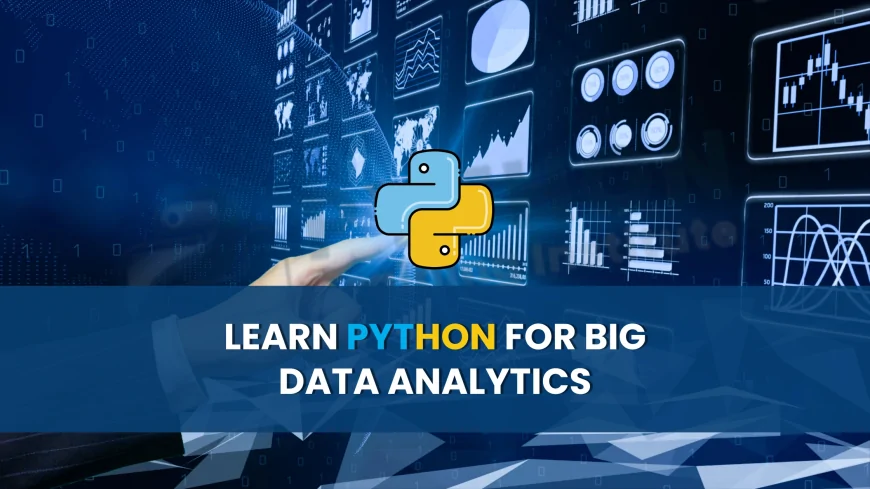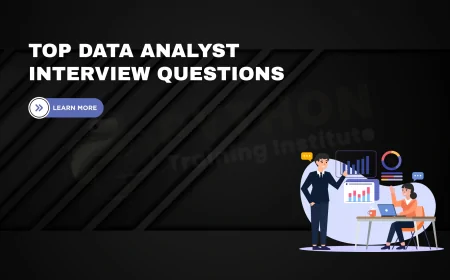Python Scripting for Finance and Accounts Pune | Python for Financial Analysis and Accounting in Pune
Learn Python scripting tailored for finance and accounts professionals in Pune. Automate financial reports, analyze data, and enhance productivity with Python. Discover top courses, benefits, and career options.

Table of Contents
- Why Learn Python for Finance & Accounts?
- Key Benefits of Python Scripting in Finance
- Who Should Enroll?
- Typical Course Curriculum
- Finance Tools and Libraries Taught
- Real-World Applications
- Top Training Institutes in Pune
- Online vs Offline Courses
- Importance of Certification
- Career Opportunities After Learning
- Importance of Projects in Training
- Course Duration & Fees
- Weekend, Evening & Fast-Track Batches
- Corporate Python Training for Finance Teams
- Internship Support in Pune
- How Python Is Used in AI for Finance
- Future Trends of Python in Finance
- Tips for Beginners in Finance Learning Python
- FAQs
- Conclusion
Why Learn Python for Finance & Accounts?
Python has become the go-to programming language for financial analysts, accountants, auditors, and investment professionals. Its ability to process vast datasets, automate reports, and integrate with Excel, SQL, and web APIs makes it ideal for modern finance roles.
Key Benefits of Python Scripting in Finance
- Automation: Eliminate manual report generation using scripts.
- Data Analysis: Work with time-series, stock, or transaction data effortlessly.
- Visualization: Generate insightful charts with libraries like Matplotlib or Seaborn.
- Integration: Fetch data from APIs, web, Excel, or databases easily.
- AI & ML Compatibility: Build predictive models for financial forecasting.
Who Should Enroll?
- Finance professionals looking to upskill
- Accounting students and graduates
- Auditors and tax consultants
- Banking professionals
- Investment analysts and wealth managers
Typical Course Curriculum
While courses may vary, here's a common Python syllabus tailored for finance/accounting professionals:
- Python Basics (Data Types, Loops, Functions)
- Pandas for Financial Data
- NumPy for Numeric Computation
- Working with Excel and CSV files
- Data Visualization (Matplotlib, Seaborn)
- APIs and Web Scraping (for stock/market data)
- SQL Integration for Finance Reports
- Basic Financial Calculations (NPV, IRR, ROI)
- Portfolio Analysis & Risk Assessment
Finance Tools and Libraries Taught
- Pandas: For tabular finance data manipulation
- OpenPyXL / XlsxWriter: For Excel automation
- Matplotlib & Plotly: Financial visualizations
- yFinance: For pulling stock data
- Scikit-learn: Basic ML in financial contexts
Real-World Applications
- Bank reconciliation automation
- Expense tracking dashboards
- GST & tax data parsing from spreadsheets
- Stock price monitoring & alerts
- Investment portfolio risk assessment
Top Training Institutes in Pune
WebAsha Technologies
Highlights:
-
Offers beginner → advanced Python modules, including Data Science, AI/ML, Full-Stack Django, and finance scripting content
-
Live instructor-led sessions, small batches, flexible timing (8 AM–8 PM daily), online-offline hybrid model
-
Job placement support, globally recognized certification, real-world projects
-
Location: Mathura Nagar, Wadgaon Sheri (1st Floor, 411014)
Why Choose WebAsha?
-
Full-spectrum training: Python → Data Science → ML → Django/Flask
-
Flexible: Multiple batches, live instructor-led sessions
-
Employment-focused: Real projects, placement assistance, recognized certification
Choosing the Right Institute
-
Curriculum fit: For pure finance/accounting scripting, focus on Pandas, NumPy, OpenPyXL, yFinance modules. Confirm all institutes include these.
-
Mode of delivery: Working professionals may prefer WebAsha or IPCS for hybrid options.
-
Placement support: Compare demo sessions, real placements, internships.
-
Batch size & timing: Prioritize small batches and timing suitable to you.
Online vs Offline Courses
Offline courses offer better networking and live interactions, while online Python finance courses provide flexibility and access to global trainers. Many Pune institutes now offer hybrid modes with recorded sessions and live doubt clearing.
Importance of Certification
A certified course in Python for finance adds value to your resume. It assures recruiters of your hands-on knowledge in scripting and finance automation. Most reputed Pune institutes offer completion certificates.
Career Opportunities After Learning
- Financial Data Analyst
- Accounts Automation Specialist
- Python Developer – Finance Domain
- Investment Research Analyst
- Finance Dashboard Developer
Importance of Projects in Training
Live finance projects give you an edge. Examples include automation of balance sheet reporting, scraping stock data, and portfolio optimization tools.
Course Duration & Fees
Most Python for Finance courses in Pune range between 30 to 60 hours. Fees vary from ₹10,000 to ₹25,000 depending on depth, tools, and trainers.
Weekend, Evening & Fast-Track Batches
Working professionals can opt for weekend or evening classes. Institutes also offer fast-track batches for urgent skill acquisition.
Corporate Python Training for Finance Teams
Custom training programs are available for corporate finance departments to train employees on automating tasks like ledger updates, Excel integration, and reconciliation processes.
Internship Support in Pune
Many institutes offer internship support post-training. Python knowledge opens internship roles in fintech firms, CA offices, and investment advisory startups.
How Python Is Used in AI for Finance
Python enables development of AI tools for fraud detection, financial forecasting, and credit risk modeling. Pune-based fintech companies prefer Python due to its ML capabilities.
Future Trends of Python in Finance
- Increased automation of tax processes
- Integration with blockchain & crypto systems
- Predictive modeling for revenue and cost
- Chatbots for accounting query resolution
Tips for Beginners in Finance Learning Python
- Start with Excel + Python combinations
- Practice small scripts daily
- Work on live reports (cash flow, expenses)
- Explore public finance datasets to analyze
FAQs –
1. What is Python scripting in finance and accounts?
Python scripting in finance involves using Python code to automate tasks such as financial data analysis, report generation, and data visualization, improving efficiency and accuracy in accounting processes.
2. Is Python useful for accountants and finance professionals?
Yes, Python is highly useful as it simplifies repetitive tasks, enables data-driven decision-making, and integrates with Excel and databases, making it ideal for modern finance professionals.
3. Do I need programming experience to learn Python for finance?
No prior programming experience is required. Many Python courses in Pune are designed for beginners from a finance or accounting background.
4. How long does it take to complete a Python scripting course in Pune?
Most finance-focused Python scripting courses can be completed in 4 to 8 weeks, depending on the mode and depth of the program.
5. What are the top institutes offering Python for finance in Pune?
Popular institutes include WebAsha Technologies offering specialized training for finance professionals.
6. What financial tasks can be automated with Python?
Python can automate balance sheet preparation, expense tracking, ledger reconciliation, invoice generation, and even tax data processing.
7. Which Python libraries are most used in financial scripting?
Common libraries include Pandas, NumPy, Matplotlib, Seaborn, yFinance, OpenPyXL, and Scikit-learn for financial data manipulation and analysis.
8. Is Python scripting in demand in the finance industry?
Yes, there is growing demand for finance professionals with Python skills, especially in roles involving data analysis, investment research, and financial automation.
9. Will I get a certificate after completing the course?
Most reputed institutes in Pune offer certification upon successful completion of the course, which can enhance your job prospects.
10. Can Python be used with Excel?
Absolutely. Python integrates well with Excel using libraries like OpenPyXL and XlsxWriter, allowing users to automate spreadsheet tasks.
11. Are there weekend or evening classes available?
Yes, many training centers in Pune offer weekend, evening, and fast-track classes tailored for working professionals.
12. Can I use Python to analyze stock market data?
Yes, with libraries like yFinance and Pandas, you can retrieve, analyze, and visualize stock market data in real-time.
13. Are internships available after the course?
Some institutes offer internship assistance or project work to help students gain real-world exposure in financial automation using Python.
14. Is Python better than Excel for finance?
While Excel is widely used, Python provides more flexibility, automation, and scalability for handling large or complex financial datasets.
15. Can I work in fintech after learning Python scripting?
Yes, Python is a preferred language in the fintech industry, making it easier to land roles related to financial analytics, automation, and app development.
16. What kind of projects are included in the course?
Courses often include real-world projects like expense automation, tax data analysis, invoice processing, and portfolio performance dashboards.
17. Is it expensive to learn Python for finance in Pune?
No, most courses are affordably priced between ₹10,000 to ₹25,000, depending on duration, content, and institute reputation.
18. Will learning Python improve my job profile?
Yes, having Python skills makes you a strong candidate for roles involving automation, data handling, and finance analytics, improving your overall job profile.
19. What roles can I apply for after learning Python for finance?
You can pursue roles like Financial Analyst, Accounts Automation Specialist, Data Analyst – Finance, or Python Developer for Finance Tools.
20. How can I start learning Python for finance as a beginner?
Start with beginner-friendly courses that focus on finance examples, practice with small projects, and gradually work with real-world datasets to build confidence and expertise.
Conclusion
Python scripting is rapidly transforming the finance and accounting sector in Pune. Whether you're a CA, MBA Finance student, or an investment professional, learning Python equips you with skills to automate, analyze, and innovate. By choosing the right course and practicing with real-world data, you can become a future-ready finance expert with strong Python foundations.
What's Your Reaction?
 Like
0
Like
0
 Dislike
0
Dislike
0
 Love
0
Love
0
 Funny
0
Funny
0
 Angry
0
Angry
0
 Sad
0
Sad
0
 Wow
0
Wow
0















